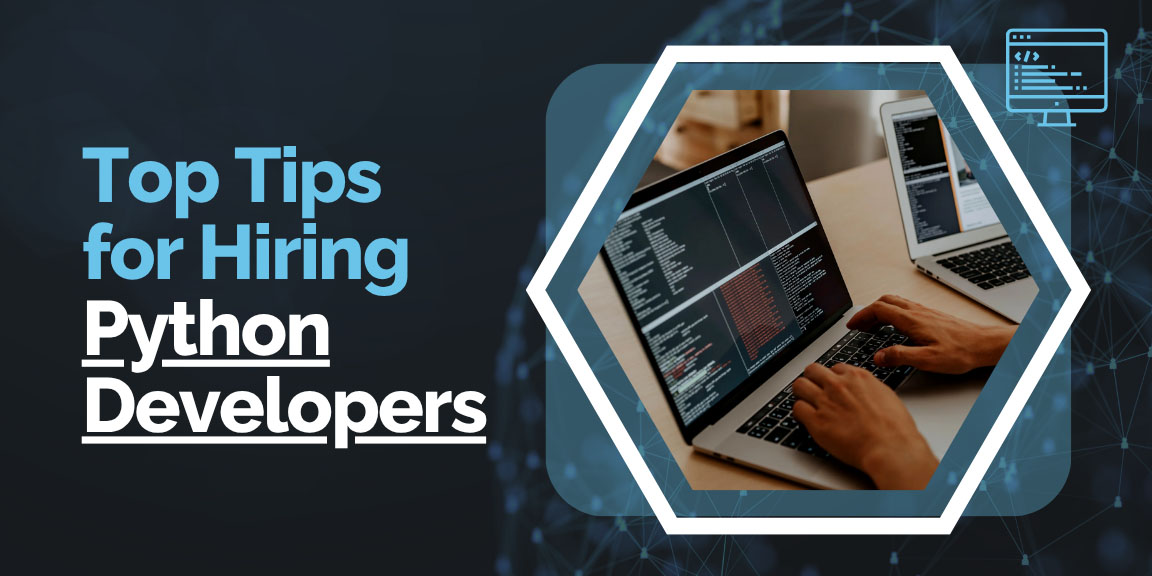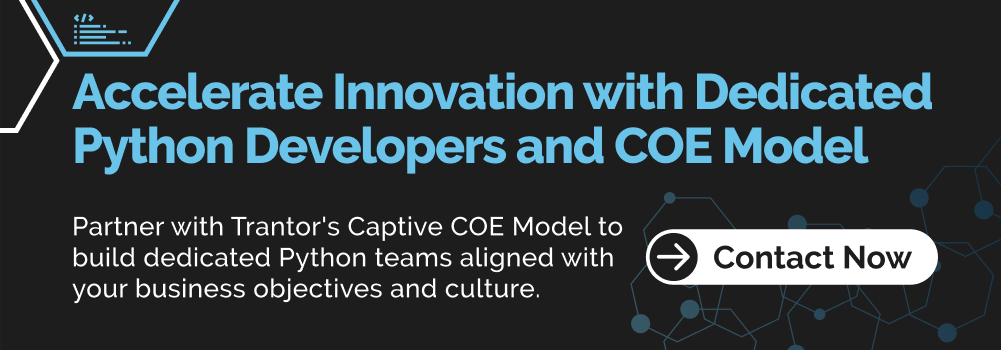Software Development, zBlog
Top 10 Tips to Hire Dedicated Python Developers for Your Project
trantorindia | Updated: October 8, 2025

Python has become the go-to programming language for startups and enterprises alike, powering everything from scalable web applications to cutting-edge AI and machine learning platforms. In 2025, the demand for skilled Python developers continues to surge as businesses seek to capitalize on its versatility and robust ecosystem. But how do you find and hire dedicated Python developers who not only boast technical expertise but also align with your project requirements and organizational culture?
This comprehensive guide aims to provide everything you need to know to hire dedicated Python developers successfully. We dive deep into each step of the hiring journey, from defining project needs to onboarding, from assessing skills to building long-term productive teams. Along the way, you’ll discover best practices, current industry insights, evaluation techniques, and essential considerations for hiring top Python talent.
Why Hiring Dedicated Python Developers Is Critical
Before jumping into hiring tactics, understanding why dedicated Python developers are a strategic asset is key.
- Focused Development: Unlike freelancers or contractors, dedicated developers exclusively work on your project, ensuring sustained focus and accountability.
- Long-Term Collaboration: This model supports deeper integration with your team, fostering better understanding of project goals, business workflows, and technical architecture.
- Scalable Resource Management: Hire the number of developers based on your roadmap and scale flexibly as requirements evolve.
- Access to Advanced Python Expertise: Dedicated developers often bring deep knowledge of Python’s leading frameworks (Django, Flask, FastAPI), libraries (Pandas, NumPy, TensorFlow), and best engineering practices.
With these advantages, businesses minimize risks related to turnover, knowledge gaps, and quality inconsistency.
Tip 1: Clearly Define Your Project Goals and Technical Requirements

Effective hiring begins with crystal-clear definitions around your project’s objectives, scope, and technology stack. Developing a precise job description aligned to your project’s technical needs ensures you attract matching candidates.
Consider detailing:
- The main Python frameworks in use (Django, Flask, FastAPI, etc.).
- Database technologies involved (PostgreSQL, MySQL, MongoDB).
- Cloud infrastructure (AWS, Azure, GCP).
- Expected responsibilities: API development, automation scripts, machine learning models, UI/backend integration.
- Desired experience levels (Junior, Mid, Senior).
- Required soft skills: communication, collaboration, adaptability.
Providing such comprehensive clarity right away reduces the chances of mismatched hiring and accelerates interviewing.
Tip 2: Choose the Ideal Hiring Model for Your Context

Selecting the right recruiting and engagement model impacts cost, control, and project agility.
- In-House Full-Time Hiring: Gives maximum control but involves higher operational costs and lengthy recruitment.
- Freelancers: Suitable for short bursts or specialized tasks, but limit engagement depth and continuity.
- Third-Party Outsourcing: Provides quicker access and cost savings but often at the expense of customization and control.
- Captive COE (Center of Excellence) Model: A hybrid approach that creates a dedicated, offshore team owned by you but managed by a trusted firm (like Trantor). It combines control, specialization, cost-efficiency, and scalability.
The Captive COE model is rapidly gaining traction as a strategic solution for enterprises seeking a long-term, dedicated Python workforce that feels like an extension of their teams.
Tip 3: Use Multiple Trusted Sourcing Channels

Maximize candidate pool quality and diversity using:
- LinkedIn: Search by skills, endorsements, and professional experience.
- GitHub and Stack Overflow: Analyze candidate code contributions and problem-solving insights.
- Freelancer Platforms (Toptal, Upwork): For vetted individual contractors.
- Technology Partners (Trantor and others): Leveraging robust networks and proven assessment pipelines.
Proactive sourcing combined with referral programs amplifies chances of finding top-tier Python developers.
Tip 4: Build a Rigorous Technical Assessment Framework

Parsing resumes isn’t enough—use robust technical assessments tailored for Python development:
- Coding challenges: Tools like HackerRank or Codility offer customizable challenges testing algorithms, Python syntax, and debugging.
- Project simulations: Assign mini-projects reflecting actual needs—building REST APIs, data parsing scripts, automation workflows.
- Code reviews: Request portfolios or exam coding on platforms like GitHub to assess quality, readability, and testing rigor.
- Framework and tooling proficiency: Evaluate expertise in Django, Flask, Flask-RESTful, PyTest, Docker, CI/CD pipelines.
Balanced evaluations uncover true capabilities beyond simple syntax knowledge.
Tip 5: Evaluate Communication and Cultural Fit

High technical skills paired with strong soft skills predict long-term success:
- Can the candidate clearly articulate thoughts and decisions?
- Do they display adaptability to various team dynamics and feedback?
- Is there alignment in working styles, values, and motivation?
Behavioral interview questions and hypothetical collaboration exercises can illuminate these traits.
Tip 6: Confirm Experience with Modern Development Practices and Tools

Hire dedicated python developers comfortable with:
- Version control: Git and branching models.
- Testing: Unit, integration, and end-to-end testing in Python.
- Containerization: Docker familiarity for development and deployment.
- Cloud integration: Experience with AWS Lambda, Azure Functions, or Google Cloud Run.
- Agile workflows: Sprint ceremonies and CI/CD pipelines usage.
Technical rigor in these areas elevates code quality and deployment reliability.
Tip 7: Invest in Structured Onboarding and Documentation

Smooth onboarding accelerates contribution:
- Provide comprehensive tech stacks, system architecture diagrams, and documentation.
- Assign mentors for knowledge transfer.
- Establish coding standards, communication protocols, and tools access early.
- Set realistic milestones and feedback loops.
Effective onboarding mitigates ramp-up time and enhances developer retention.
Tip 8: Offer Competitive Salaries and Benefits

Based on regional data and Python talent trends:
- Research market benchmarks on platforms like Glassdoor and Stack Overflow’s Developer Survey.
- Consider compensation packages inclusive of bonuses, health benefits, career growth, and remote work flexibility.
- Non-monetary perks like learning budgets and career mentorship boost attractiveness.
Tip 9: Maintain Transparent and Continuous Communication

Frequent check-ins, clear KPIs, and collaborative tools are vital:
- Utilize Jira, Asana for task management.
- Leverage Slack, Teams, or Zoom for real-time communication.
- Schedule regular retrospectives and code reviews.
Transparency builds trust and agility.
Tip 10: Commit to Long-Term Team Development

Build loyalty and expertise by:
- Enabling continuous learning (certifications, courses).
- Recognizing efforts and achievements.
- Providing progressive challenges and growth paths.
Long-term developers understand project nuances, reduce churn, and improve product quality.
Benefits of Hiring Dedicated Python Developers from a Company Like Trantor
Partnering with Trantor offers:
- Access to an elite talent pool vetted for technical skills and cultural fit.
- Agile, scalable team setups aligned with your project demands.
- End-to-end support from screening through onboarding and ongoing management.
- Cost efficiency with enterprise-grade delivery quality.
- Robust IP protection and data security compliant with global standards.
Frequently Asked Questions (FAQs)
Q1: How long does it typically take to hire dedicated Python developers?
A: Approximately 4–8 weeks depending on requirements and assessment thoroughness.
Q2: Can remote Python developers work as effectively as in-house?
A: Absolutely, with structured communication tools and clear expectations.
Q3: What frameworks and tools should my developers know?
A: FastAPI, PyTest, Docker, Git, cloud platforms , Django and Flask like AWS are essential.
Q4: What differentiates freelancing and dedicated hiring?
A: Dedication, team integration, long-term commitment, and accountability.
Q5: How important is cultural fit?
A: Highly; it drives collaboration, retention, and productivity.
Conclusion: Why Partner with Trantor and Leverage the Captive COE Model?
Hiring dedicated Python developers is fundamental to accelerating innovation and maintaining competitive advantage. Yet, the recruitment process can be complex and costly without the right expertise and strategy.
Trantor offers an end-to-end solution to build and manage your dedicated Python teams, combining deep industry knowledge, a vast talent network, and proven hiring methodologies. Our Captive Center of Excellence (COE) Model is at the forefront of innovation in talent acquisition and management:
- It allows you to establish a dedicated offshore team fully aligned with your business objectives and culture.
- You gain complete control over processes, quality, and workflows just as if the team were in-house.
- The model ensures cost efficiencies while maintaining highest security and IP protection standards.
- Rapid scaling capabilities mean your team can grow or reorient agilely with evolving project needs.
- Trantor manages day-to-day operations, allowing you to focus on strategic goals.
If your vision is to hire dedicated Python developers who deliver exceptional results with predictable quality and governance, then Trantor’s Captive COE Model is the perfect partnership choice.
Learn more about our differentiated approach and Python developer hiring services




